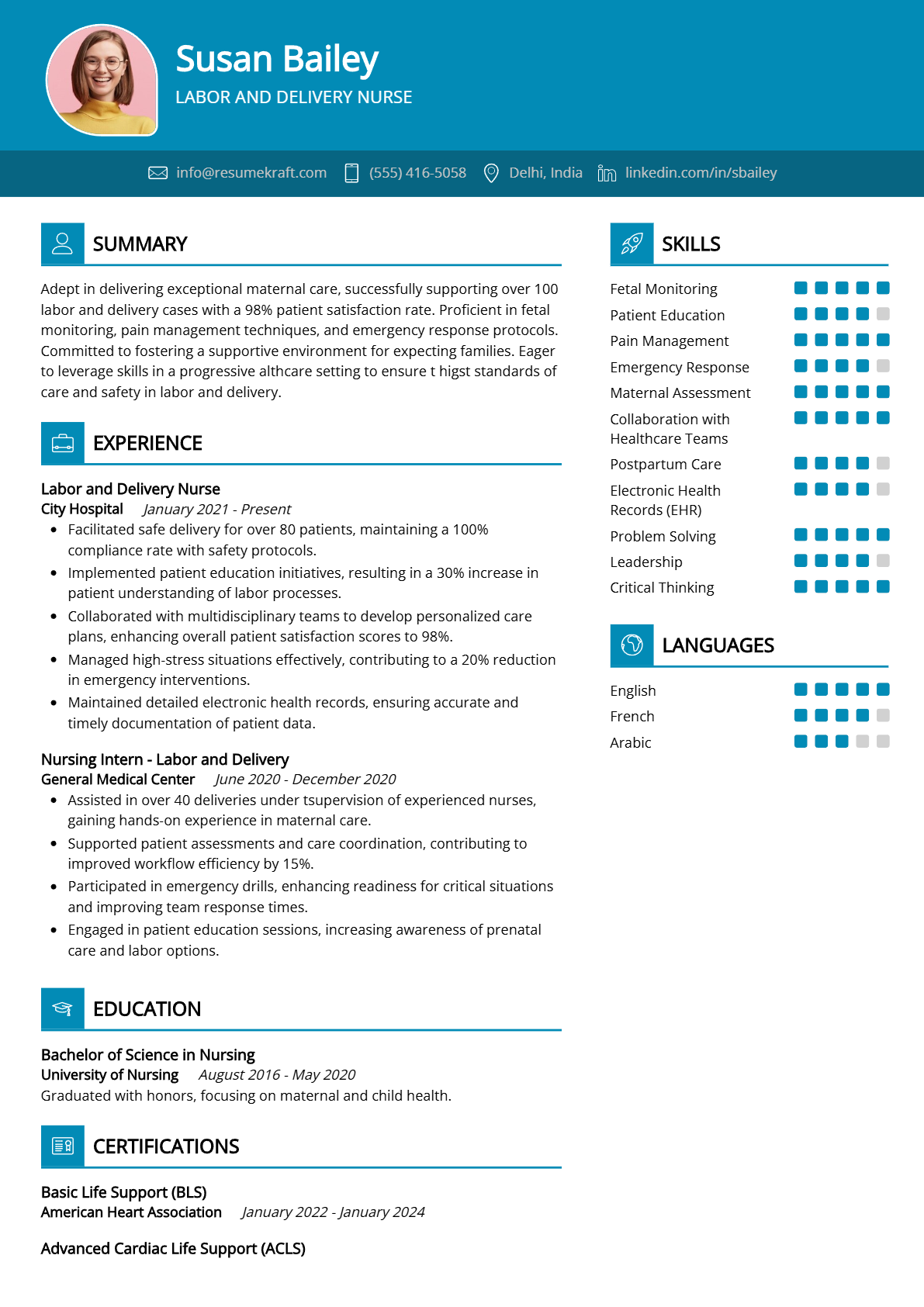
The role of a Nurse is both challenging and rewarding, encompassing a wide range of responsibilities from patient care to administrative duties. Nurses are critical to the healthcare system, providing compassionate support, advocating for patients’ needs, and ensuring safety and well-being in various settings. In today’s job market, the demand for qualified nursing professionals continues to rise, driven by an aging population and a growing focus on healthcare accessibility. This article aims to guide aspiring nurses in crafting a compelling resume that highlights their skills, experiences, and dedication to this essential profession.
- Nurse resume examples
- How to format a Nurse resume
- How to write your Nurse resume experience
- How to list your hard skills and soft skills on your resume
- How to list your certifications and education on your resume
- How to write your Nurse resume summary or objective
- Additional sections for a Nurse resume
- Key takeaways for writing a professional Nurse resume
- Frequently Asked Questions
Nurse resume examples
Nurse resume examples serve as valuable resources for job seekers in the healthcare field, showcasing effective formatting, language, and content tailored to nursing roles. By examining these examples, candidates can better understand how to highlight their clinical skills, certifications, and relevant experiences, ensuring their resume stands out to potential employers. These insights can significantly improve their chances of securing interviews and advancing their nursing careers.
Nurse Resume
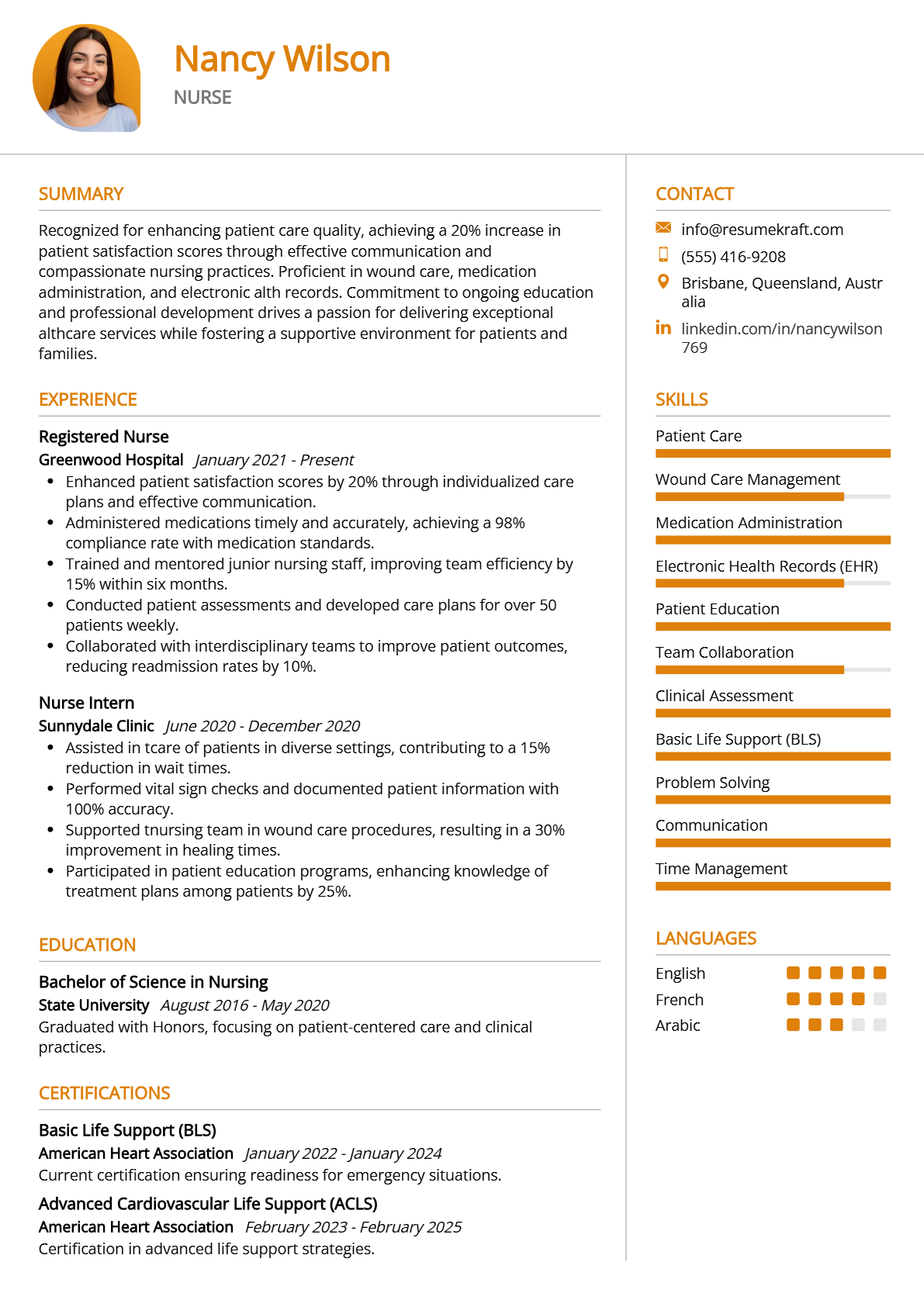
Why This Resume Works
This resume effectively highlights the candidate’s relevant skills, such as Patient Care and Wound Care Management, essential for a Nurse position. With approximately four years of experience as a Registered Nurse and Nurse Intern, it demonstrates practical expertise in critical areas like Medication Administration and Electronic Health Records (EHR). The clear format enhances readability, ensuring compatibility with ATS systems commonly used in healthcare hiring.
Registered Nurse Resume
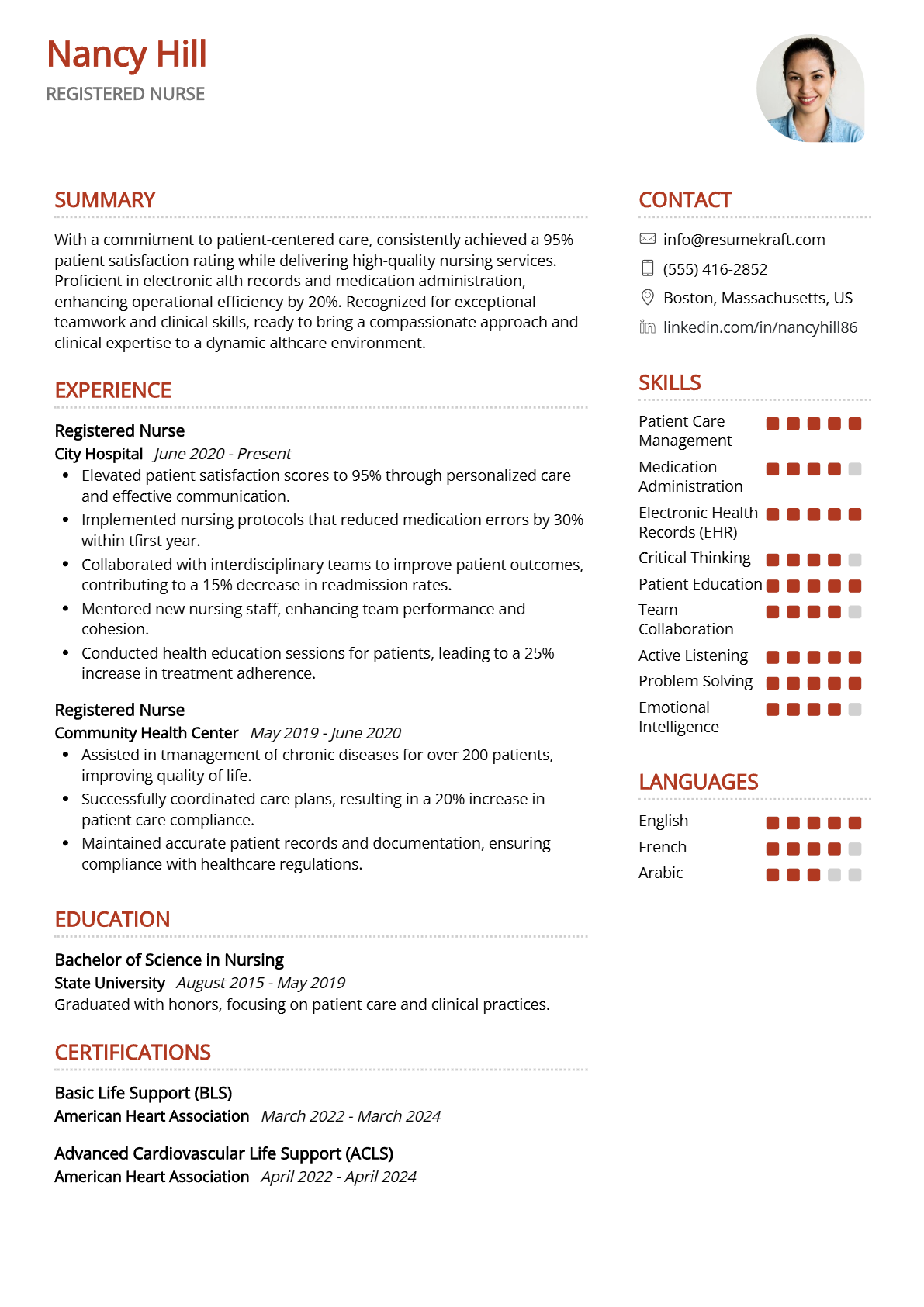
Why This Resume Works
This resume stands out for a Registered Nurse position due to its clear emphasis on relevant skills like Patient Care Management and Medication Administration, which are critical in nursing. The structured format highlights six years of experience, enhancing credibility while ensuring easy readability. By incorporating keywords aligned with ATS compatibility—such as Electronic Health Records and Critical Thinking—it enhances visibility in job searches. Furthermore, the strategic presentation of achievements underscores the candidate’s impact in patient education and care quality, making it particularly compelling for hiring managers.
Licensed Practical Nurse Resume
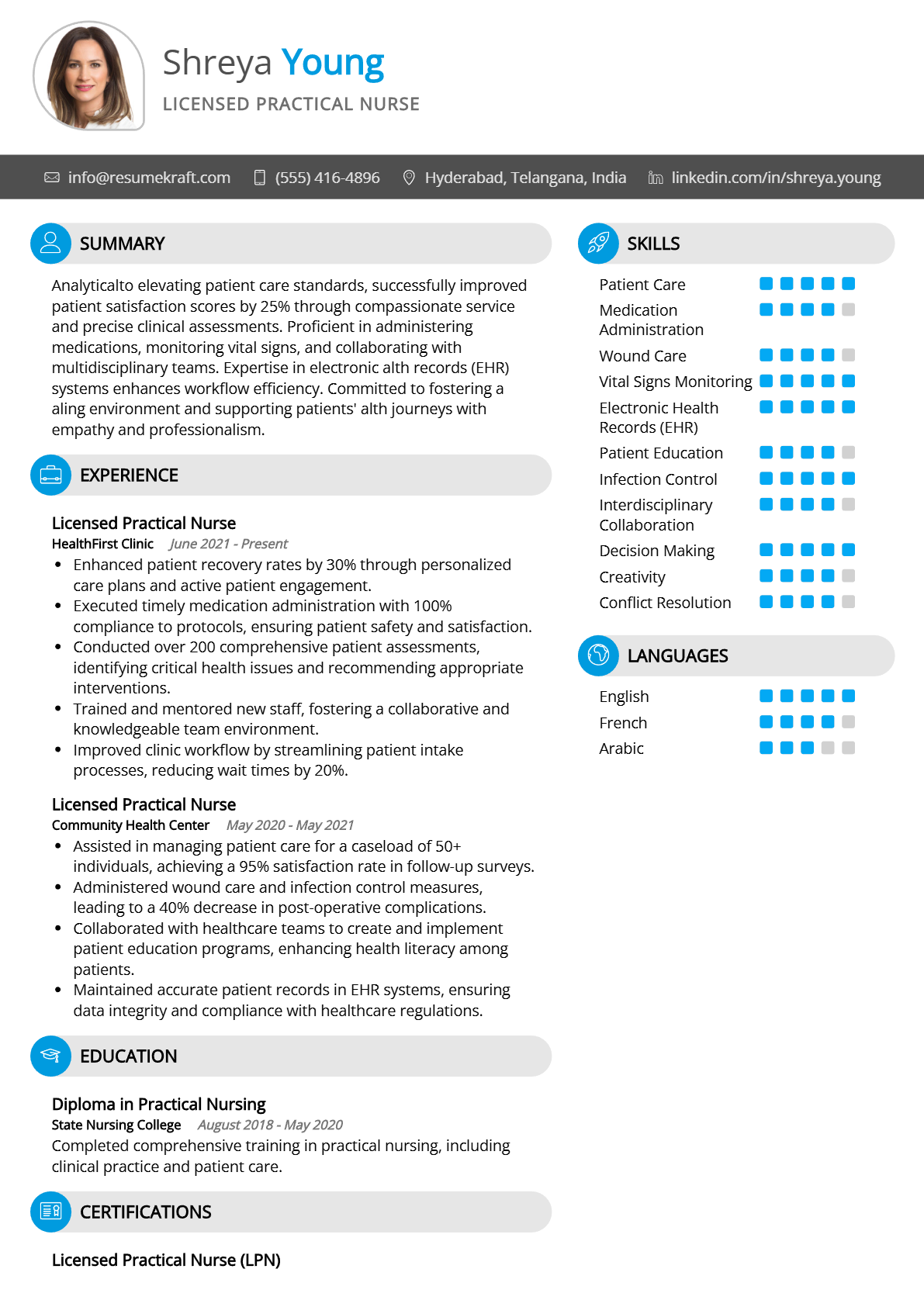
Why This Resume Works
This resume effectively highlights the candidate’s relevant skills and extensive experience in patient care, medication administration, and wound care, making them a strong fit for the Licensed Practical Nurse position. Its clear format emphasizes key competencies and includes specific achievements that resonate with potential employers. Additionally, the structured layout enhances ATS compatibility by incorporating industry-specific keywords like “Electronic Health Records” and “Vital Signs Monitoring,” ensuring visibility in applicant tracking systems. Overall, this targeted approach showcases the candidate’s qualifications effectively for the role.
ICU Nurse Resume
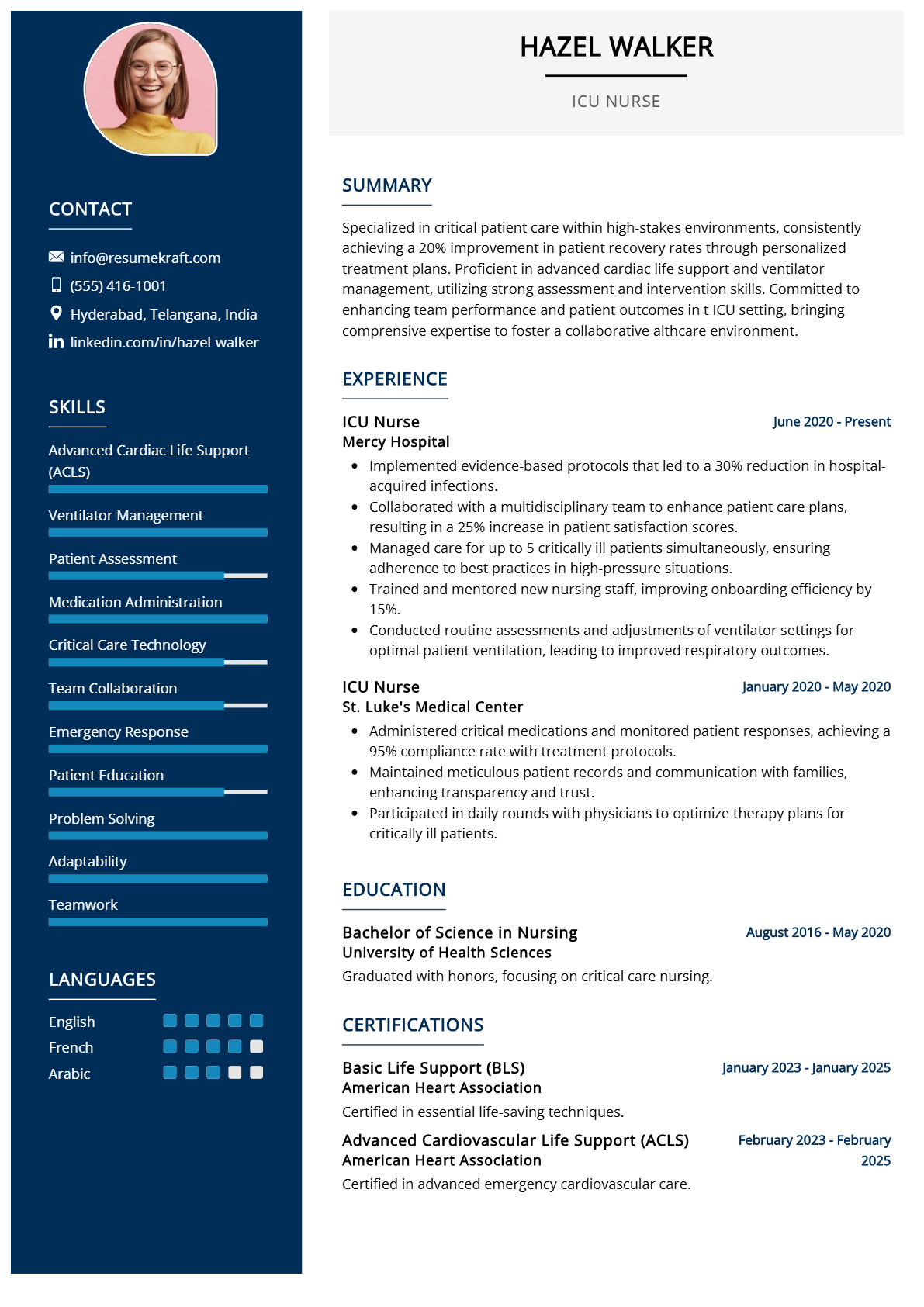
Why This Resume Works
This resume effectively highlights the candidate’s qualifications for an ICU Nurse position by showcasing critical skills such as ACLS, ventilator management, and patient assessment, all essential in high-stakes environments. The structured format emphasizes relevant experience, with approximately five years in ICU nursing, ensuring clarity and ease of reading. It is optimized for ATS compatibility through the use of industry-specific keywords. Additionally, strategic presentation of achievements related to patient outcomes enhances its impact, making it a compelling choice for hiring managers in critical care settings.
Emergency Room Nurse Resume
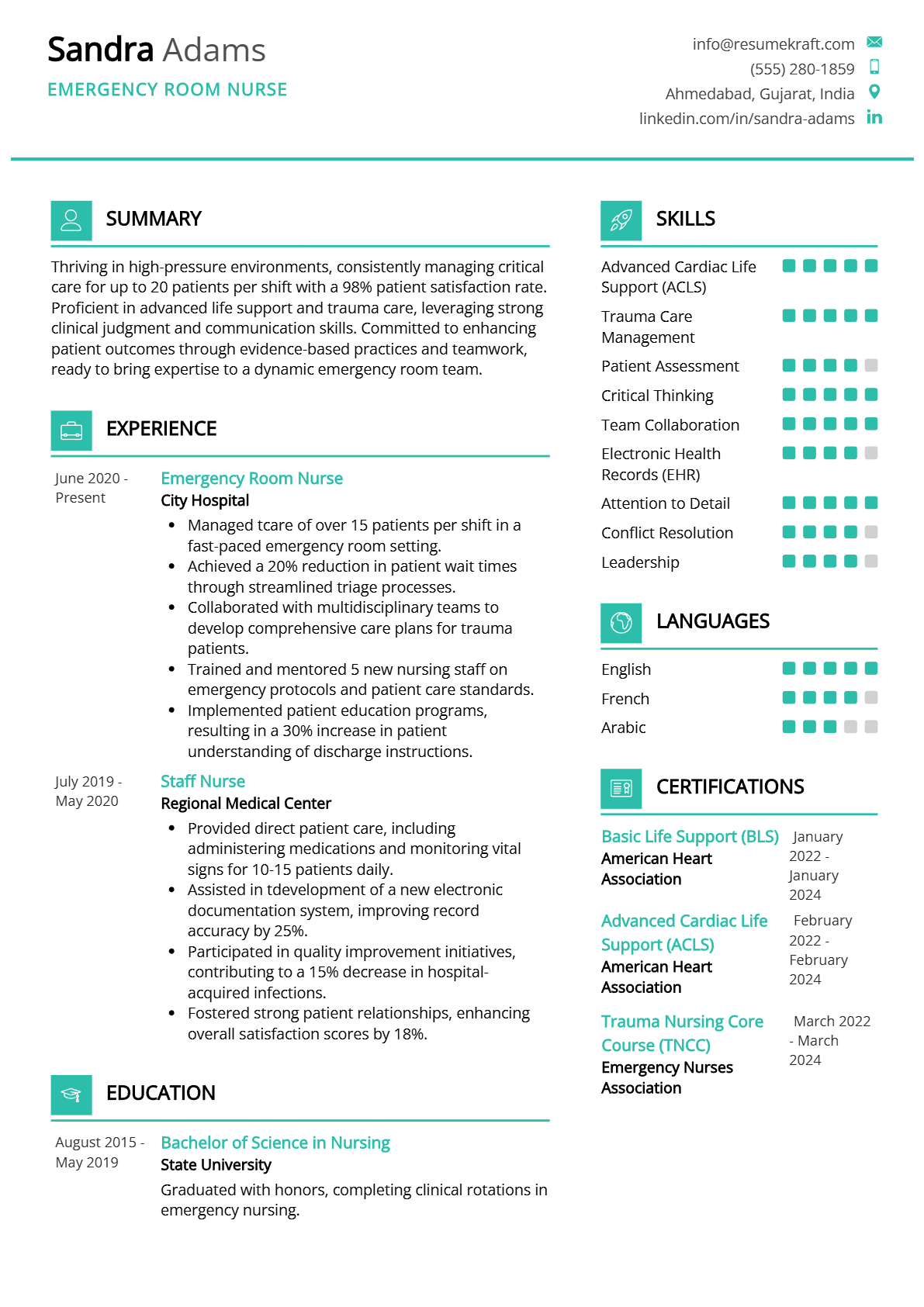
Why This Resume Works
This resume effectively positions the candidate for the Emergency Room Nurse role by highlighting essential skills like ACLS, trauma care management, and critical thinking, which are crucial in fast-paced emergency settings. The structured format emphasizes relevant experience as an Emergency Room Nurse over six years, ensuring clarity and quick reference for hiring managers. Additionally, it incorporates industry-specific keywords for ATS compatibility. By strategically showcasing achievements related to patient outcomes and teamwork, this resume demonstrates the candidate’s capability to excel in high-pressure environments.
Pediatric Nurse Resume
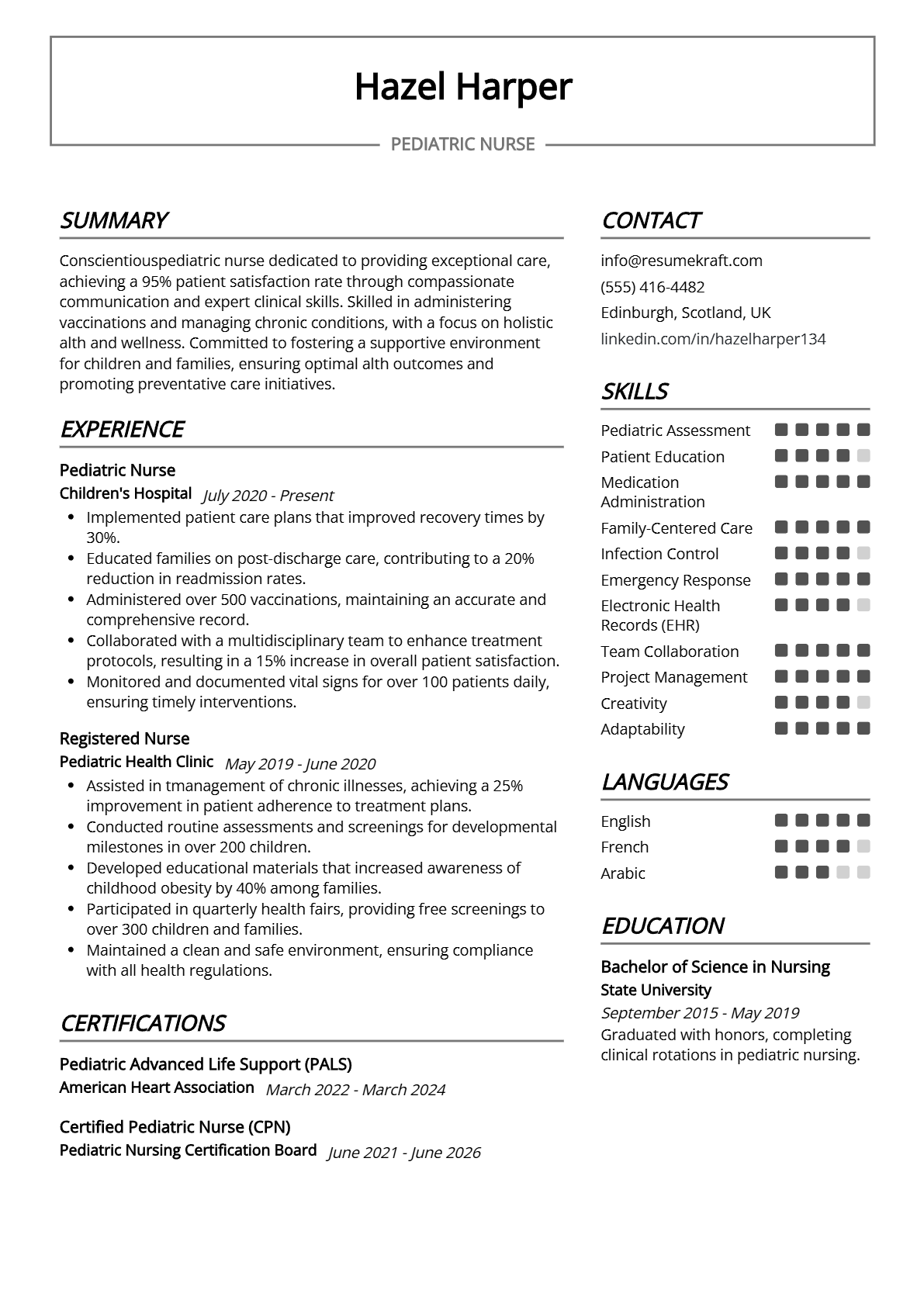
Why This Resume Works
This resume effectively showcases the candidate’s targeted skills and extensive experience as a Pediatric Nurse, emphasizing essential competencies such as Pediatric Assessment and Family-Centered Care. The clear format highlights relevant achievements and aligns with industry standards, enhancing readability for hiring managers. Its structure is ATS-friendly, ensuring key terms related to pediatric nursing are easily recognized by applicant tracking systems. By strategically presenting accomplishments that resonate with pediatric care, this resume positions the candidate as a strong contender for the role in a competitive field.
Oncology Nurse Resume
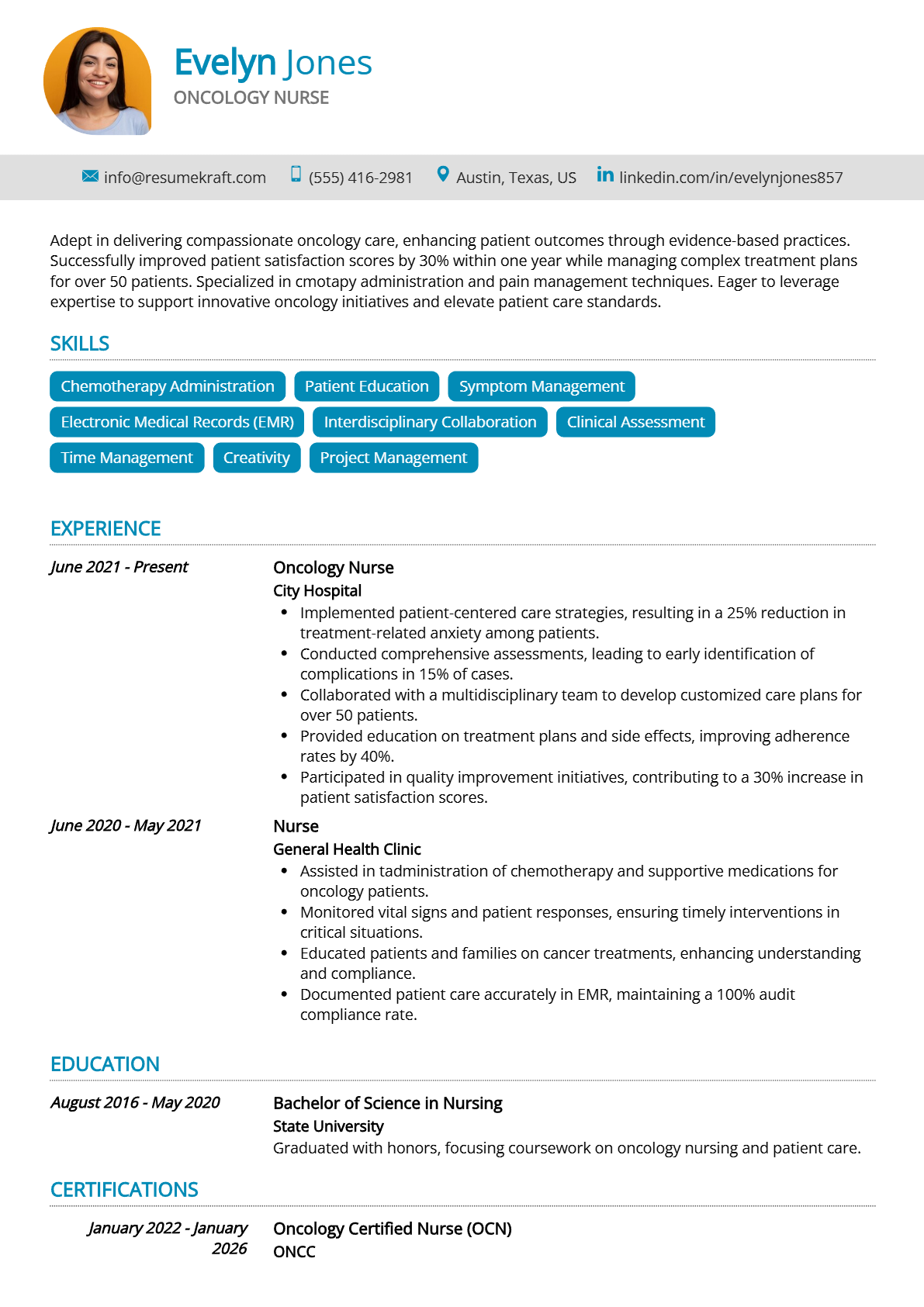
Why This Resume Works
This resume effectively highlights the candidate’s relevant experience and key skills tailored for an Oncology Nurse position. The inclusion of specialized competencies, such as Chemotherapy Administration and Symptom Management, directly aligns with job requirements. Its structured format enables easy navigation, showcasing both qualifications and achievements prominently. By using industry-specific keywords, the resume supports ATS compatibility, ensuring it will pass initial screenings. Additionally, strategic presentation of patient education experiences underscores the candidate’s commitment to holistic care in oncology nursing, making this resume stand out.
Surgical Nurse Resume
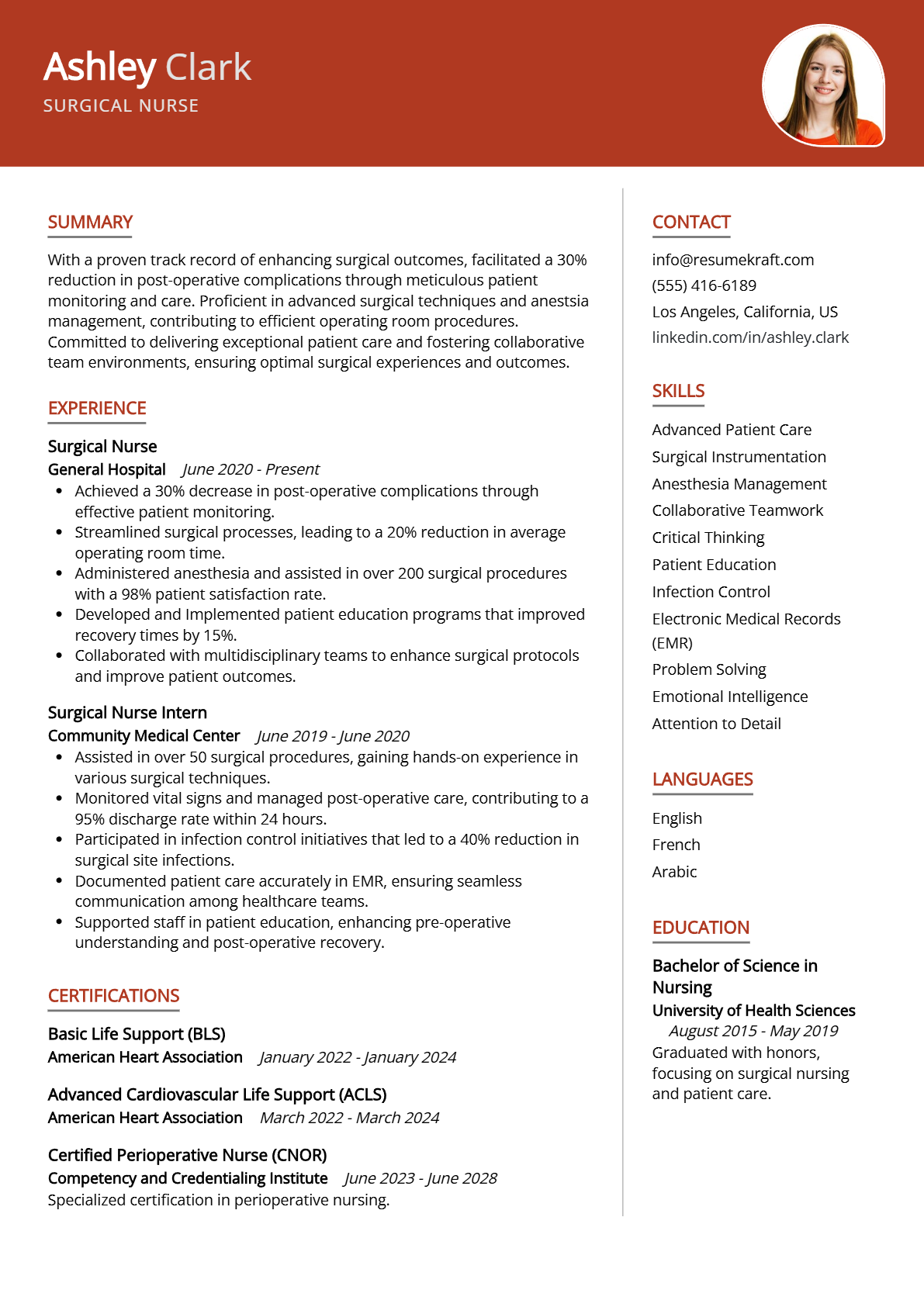
Why This Resume Works
This resume effectively highlights the candidate’s extensive experience as a Surgical Nurse and Intern, totaling around six years, showcasing their proficiency in advanced patient care and surgical instrumentation. The clear format emphasizes critical skills like anesthesia management and teamwork, essential for collaborative surgical environments. Its structure is ATS-friendly, incorporating relevant keywords that improve visibility in applicant tracking systems. Additionally, strategic presentation of achievements demonstrates tangible contributions to patient outcomes, making this resume particularly compelling for a Surgical Nurse position.
Labor and Delivery Nurse Resume

Why This Resume Works
This resume effectively highlights the candidate’s relevant skills—such as fetal monitoring and pain management—essential for a Labor and Delivery Nurse. With four years of direct experience, including a nursing internship, it showcases a strong foundation in maternal assessment and emergency response. The structured format enhances readability, making it easy for hiring managers to identify key qualifications. Additionally, the use of industry-specific keywords ensures ATS compatibility, while strategically presented achievements emphasize the candidate’s impact in previous roles, aligning perfectly with the job requirements.
Psychiatric Nurse Resume
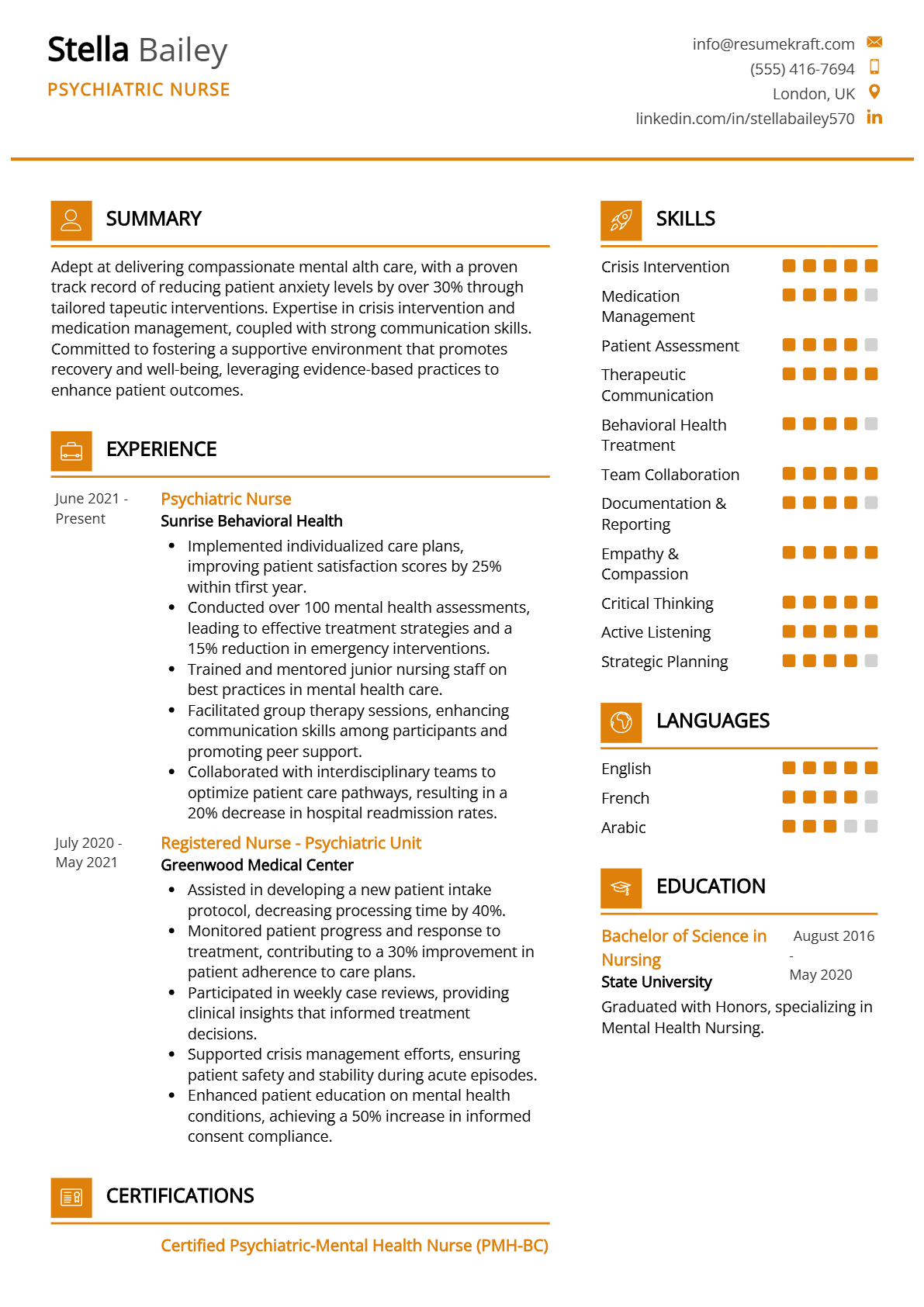
Why This Resume Works
This resume stands out for the Psychiatric Nurse position due to its emphasis on key skills such as crisis intervention and therapeutic communication, which are crucial in mental health care. With approximately five years of relevant experience in a psychiatric unit, it highlights both practical expertise and clinical knowledge. The structured format enhances readability, while strategic keyword placement ensures ATS compatibility. Additionally, showcasing specific achievements related to patient outcomes effectively aligns the candidate’s qualifications with the demands of psychiatric nursing, enhancing overall appeal to employers.
Home Health Nurse Resume
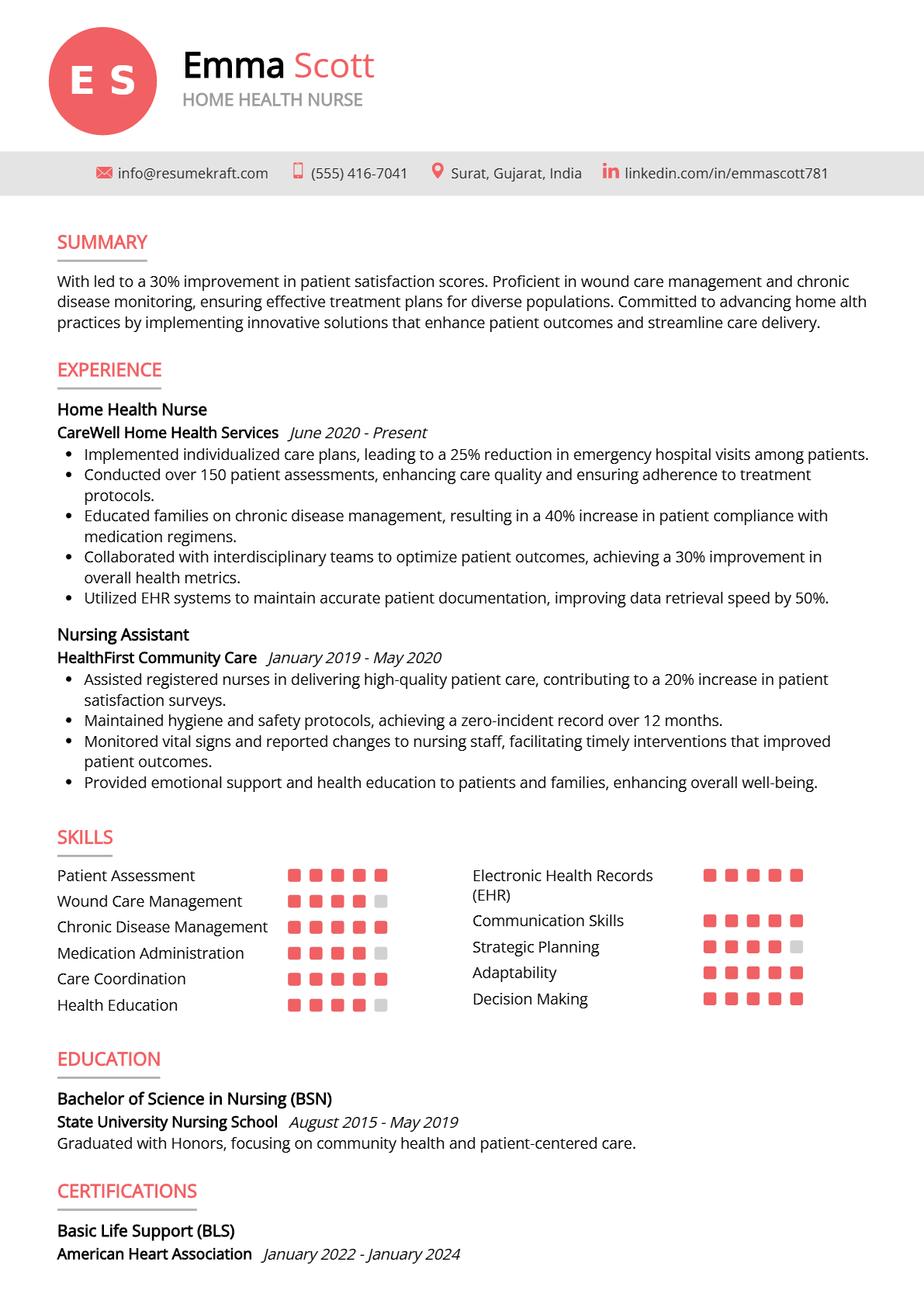
Why This Resume Works
This resume effectively highlights the candidate’s relevant skills, such as patient assessment and chronic disease management, directly aligning with the Home Health Nurse position. The structured format clearly delineates experience, showcasing six years in nursing roles that enhance credibility. Its keyword-rich content ensures ATS compatibility, increasing visibility to hiring managers. Additionally, strategic presentation of achievements in wound care and care coordination emphasizes the candidate’s ability to deliver quality patient outcomes, making this resume stand out in a competitive field.
Geriatric Nurse Resume
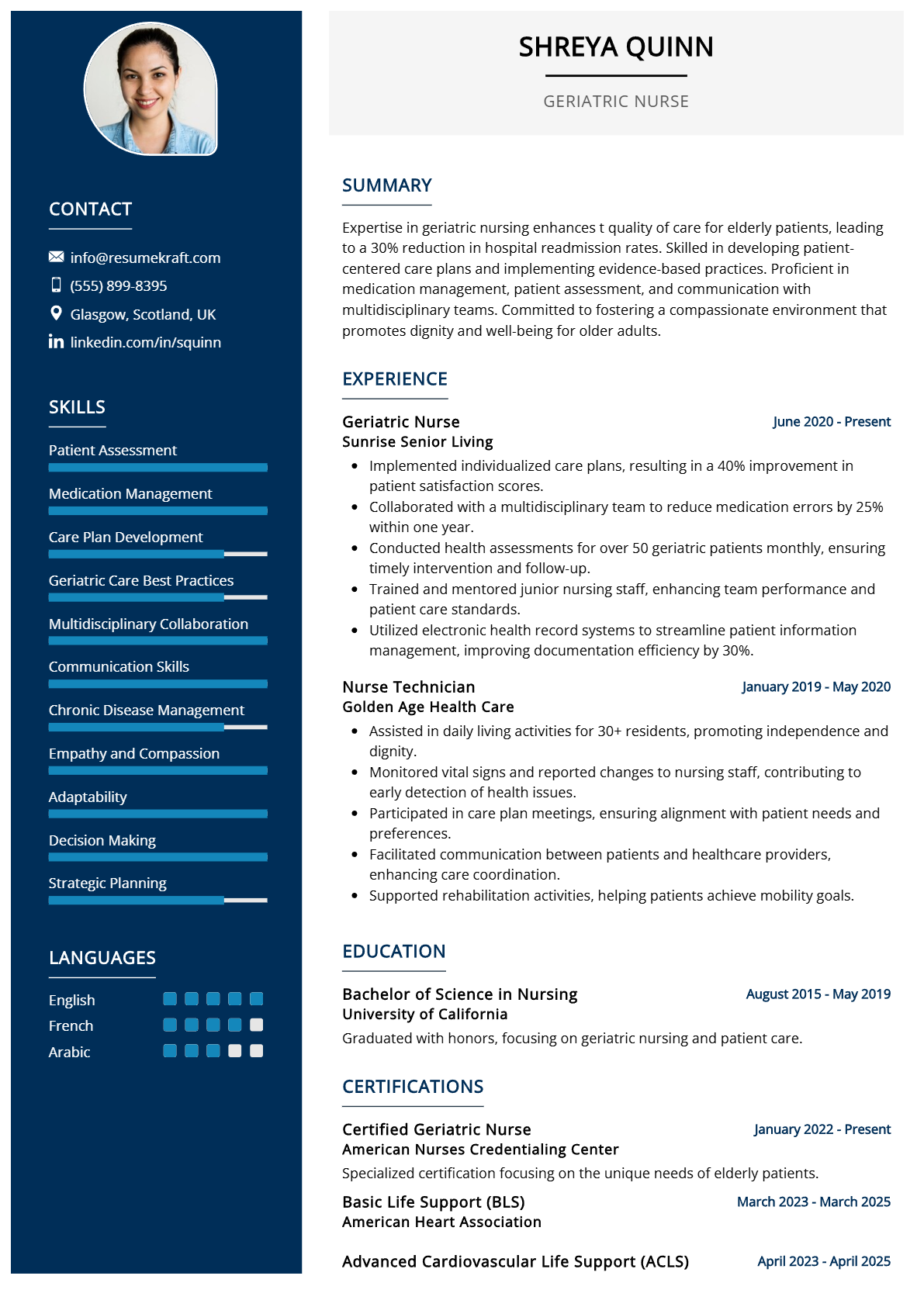
Why This Resume Works
This resume effectively highlights the candidate’s expertise in geriatric nursing through targeted skills such as patient assessment and medication management, directly aligning with job requirements. The clear structure enhances readability, allowing hiring managers to quickly grasp qualifications. Its ATS-friendly format includes relevant keywords specific to geriatric care, ensuring visibility during automated screenings. Additionally, the strategic presentation of achievements showcases the candidate’s impact on patient outcomes and collaboration within multidisciplinary teams, making it a compelling choice for a Geriatric Nurse position.
Cardiac Care Nurse Resume
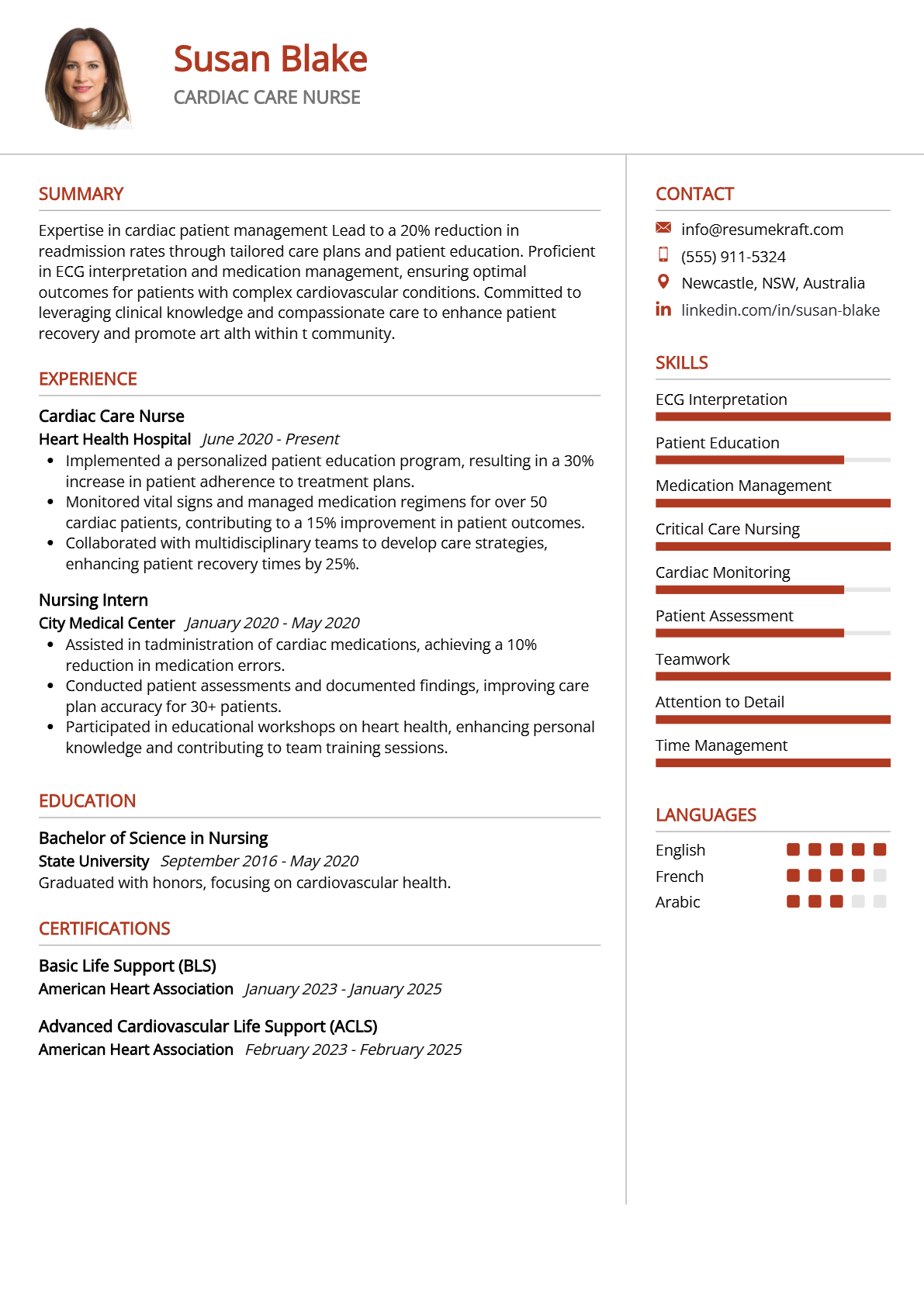
Why This Resume Works
This resume effectively highlights the candidate’s specialized skills in ECG interpretation and cardiac monitoring, essential for a Cardiac Care Nurse position. With approximately five years of relevant experience, it showcases both practical expertise and critical care nursing capabilities. The structured format allows for quick scanning by hiring managers and aligns with ATS compatibility through the use of industry-specific keywords. Additionally, the strategic presentation of achievements emphasizes patient education and medication management, demonstrating the candidate’s commitment to quality cardiac care.
Travel Nurse Resume
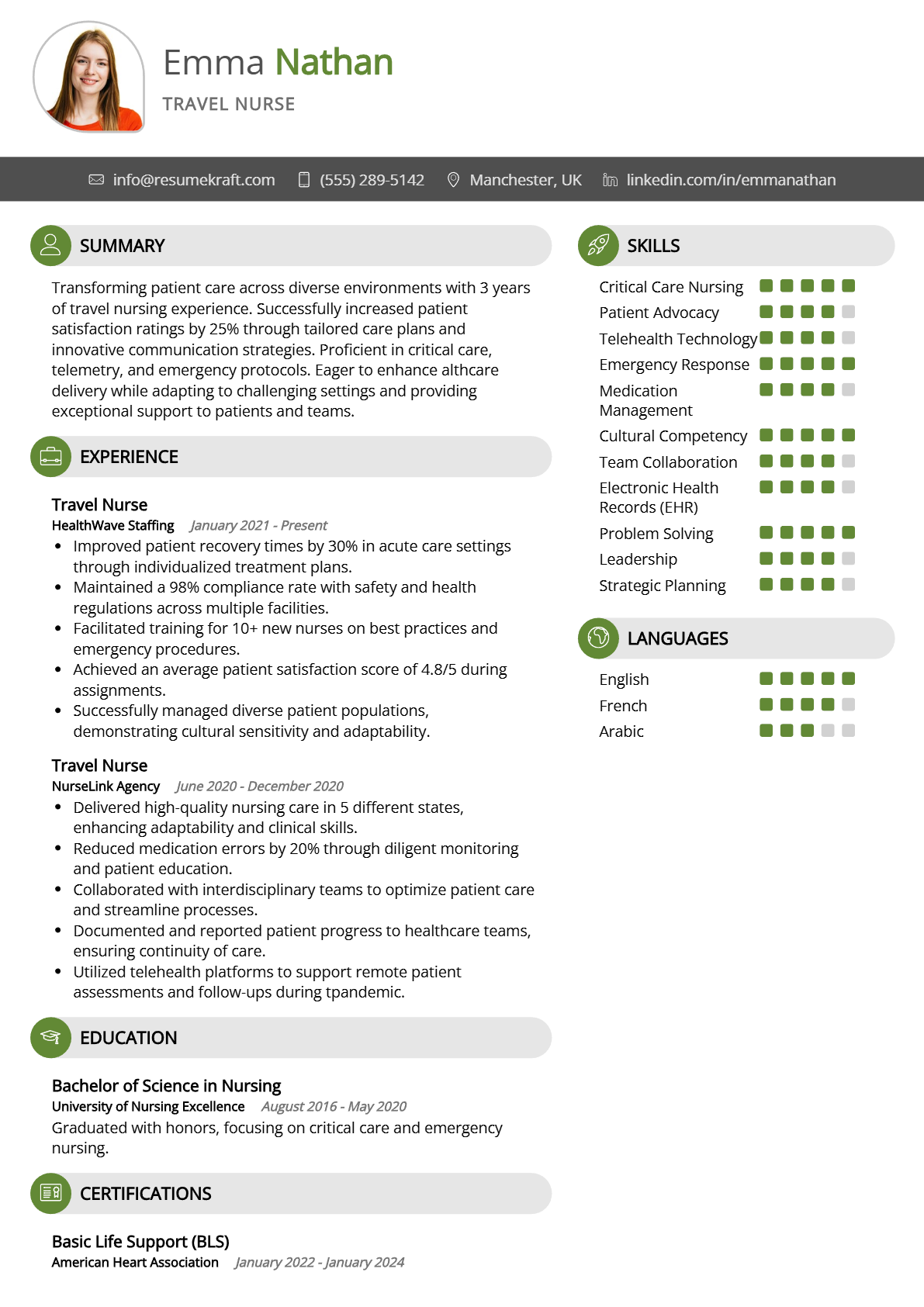
Why This Resume Works
This resume effectively highlights the candidate’s four years of travel nursing experience, showcasing essential skills like Critical Care Nursing and Emergency Response, which are crucial in diverse healthcare settings. The structured format emphasizes key competencies while ensuring clarity for hiring managers. Its ATS-friendly design integrates relevant keywords, enhancing visibility in applicant tracking systems. Additionally, strategic presentation of achievements related to Patient Advocacy and Telehealth Technology demonstrates adaptability and commitment, making this resume particularly compelling for a Travel Nurse position.
Nurse Practitioner Resume
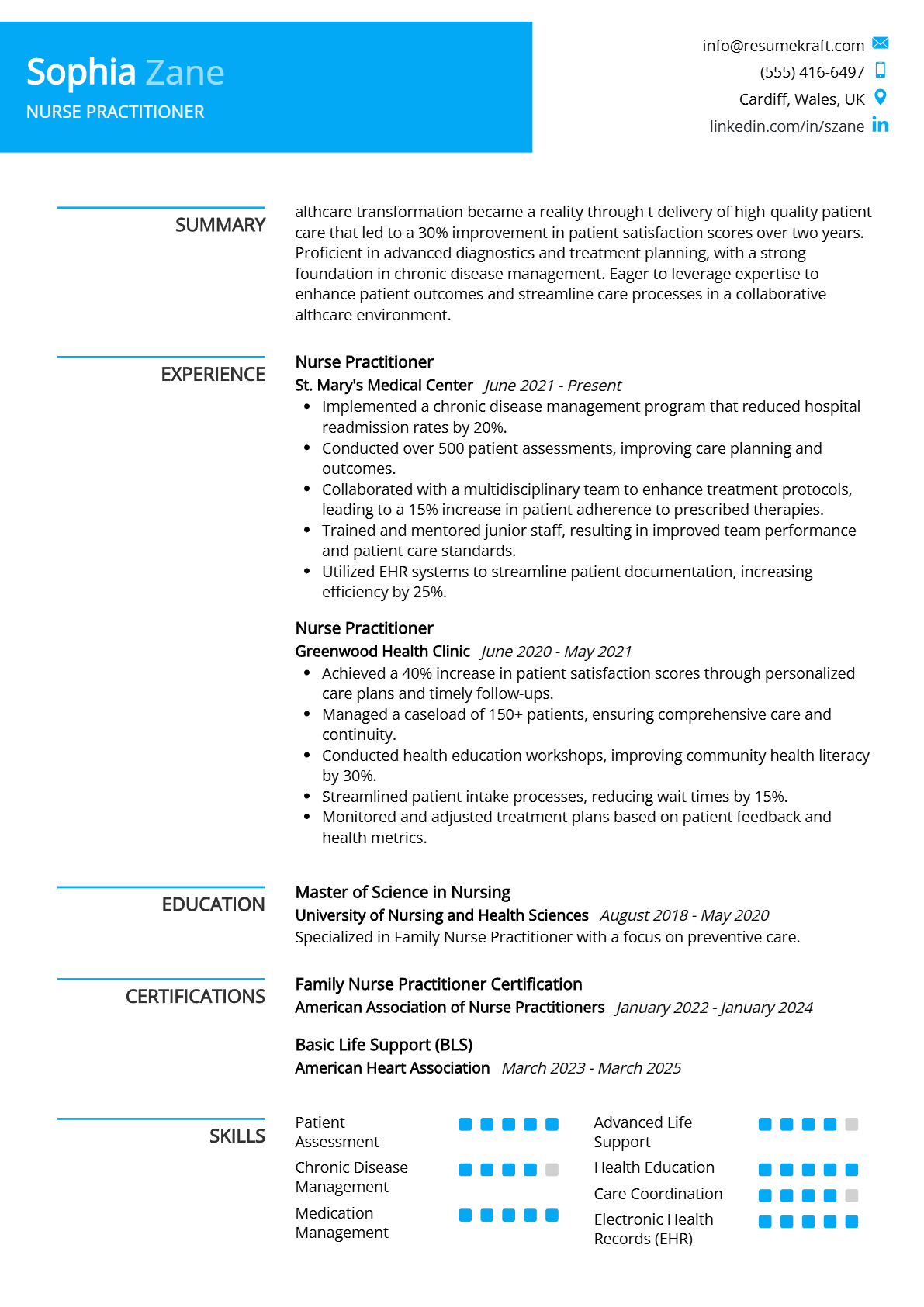
Why This Resume Works
This resume effectively positions the candidate for a Nurse Practitioner role by highlighting relevant skills such as Patient Assessment and Chronic Disease Management, directly aligning with job requirements. With approximately five years of experience, it demonstrates practical expertise and competence. The clear format enhances readability, ensuring hiring managers can quickly identify qualifications. Additionally, incorporating keywords pertinent to ATS ensures compatibility for automated screenings.
How to format a Nurse resume
Proper formatting of a Nurse resume is vital to make a strong first impression on potential employers. A well-structured resume format not only showcases your qualifications but also enhances readability, making it easier for hiring managers to identify your strengths.
- Use clear section headings such as “Clinical Experience” and “Education” to guide the reader through your resume. This helps emphasize your qualifications and relevant skills in a structured manner.
- Opt for a clean, professional font like Arial or Calibri in size 10-12. Consistency in font style and size enhances readability and maintains a polished appearance throughout your resume.
- Incorporate bullet points to list your responsibilities and achievements. This format allows hiring managers to quickly scan your experience and pick out key information relevant to the Nurse role.
- Keep margins between 0.5 to 1 inch to create a balanced layout. Adequate white space improves overall presentation and prevents your resume from appearing cluttered or overwhelming to the reader.
- Limit your resume to one page if you have less than 10 years of experience. A concise format ensures that you highlight the most relevant information without losing the reader’s attention.
How to write your Nurse resume experience
Effectively presenting work experience on a Nurse resume is essential, as this section highlights your clinical skills, patient care abilities, and professional achievements. Employers are primarily looking for specific examples of how you have positively impacted patient outcomes, collaborated with healthcare teams, and adhered to best practices in patient safety and care.
A well-crafted experience section not only showcases your responsibilities but also quantifies your contributions, making it easier for hiring managers to assess your fit for their organization. Demonstrating your expertise in various nursing environments and your ability to handle challenges can significantly enhance your chances of securing an interview.
Worked as a nurse for several years. Assisted doctors and provided patient care.
Provided comprehensive care to 20+ patients daily in a fast-paced ER, collaborating with a team to reduce wait times by 30% and improve patient satisfaction scores by 25%.
How to list your hard skills and soft skills on your resume
In the nursing profession, both hard and soft skills are essential for effective patient care and collaboration within healthcare teams. Hard skills encompass the technical abilities and medical knowledge required to perform clinical tasks, while soft skills reflect a nurse’s interpersonal qualities that enhance communication, empathy, and teamwork. A well-rounded Nurse resume should showcase a balance of these skills to demonstrate both proficiency in medical procedures and the ability to connect with patients and colleagues.
Hard Skills:
- Patient Assessment: Conducting thorough evaluations of patients’ health status.
- Medication Administration: Safely administering medications and understanding pharmacology.
- IV Therapy: Inserting and managing intravenous lines for medication delivery.
- Wound Care: Providing appropriate treatment for various types of wounds.
- Basic Life Support (BLS): Performing CPR and emergency interventions as needed.
- Electronic Health Records (EHR): Proficient in documenting patient information in digital systems.
- Vital Signs Monitoring: Regularly checking and interpreting vital signs.
- Pediatric Care: Understanding and addressing the unique needs of children.
- Geriatric Care: Providing specialized care for elderly patients.
- Infection Control: Implementing practices to prevent healthcare-associated infections.
- Charting and Documentation: Accurately recording patient care and treatment plans.
- Clinical Procedures: Executing various medical procedures within scope of practice.
- Patient Education: Teaching patients about health conditions and self-care strategies.
- Emergency Response: Effectively responding to medical emergencies in the workplace.
- Diagnostic Tests Interpretation: Understanding results from lab tests and imaging studies.
Soft Skills:
- Empathy: Understanding and sharing the feelings of patients to provide compassionate care.
- Communication: Clearly conveying information to patients and collaborating with healthcare teams.
- Teamwork: Working effectively with diverse healthcare professionals to improve patient outcomes.
- Adaptability: Adjusting to changing situations and patient needs in a fast-paced environment.
- Problem-Solving: Quickly identifying issues and implementing effective solutions.
- Time Management: Prioritizing tasks efficiently to handle multiple responsibilities.
- Attention to Detail: Ensuring accuracy in patient care and documentation.
- Emotional Intelligence: Managing one’s own emotions and understanding the emotions of others.
- Conflict Resolution: Navigating and resolving disputes among patients or team members.
- Patient Advocacy: Representing and supporting patients’ needs and rights.
- Critical Thinking: Analyzing situations and making informed decisions based on evidence.
- Interpersonal Skills: Building rapport with patients and fostering a positive healthcare environment.
- Stress Management: Effectively handling the pressures of the nursing profession.
- Leadership: Guiding and mentoring colleagues while promoting a positive work culture.
- Cultural Competence: Respecting and understanding diverse cultural backgrounds in patient care.
- Compassion: Providing care with kindness and understanding towards patients’ experiences.
How to list your certifications and education on your resume
When presenting certifications and education on a Nurse resume, prioritize clarity and relevance. Start with your highest degree first, including the institution’s name, degree earned, and graduation date. Highlight pertinent nursing certifications, such as RN, BSN, or specialized certifications like ACLS or PALS, as these demonstrate your qualifications and commitment to the profession.
Ensure to list any ongoing education or workshops that showcase your dedication to continuous learning. Be sure to include your state nursing license details, as this is essential for employment. Overall, a well-organized section enhances your credibility and makes it easier for employers to gauge your qualifications at a glance.
Graduated from nursing school and took some certifications. I have a license and a few courses.
Bachelor of Science in Nursing (BSN), University of Health, May 2021. Certified in Basic Life Support (BLS) and Advanced Cardiovascular Life Support (ACLS). Active RN License, State of California, License #: 123456.
How to write your Nurse resume summary or objective
A strong resume summary or objective is crucial for a Nurse position as it serves as the first impression to potential employers. A well-crafted summary highlights your key qualifications, skills, and experiences, allowing hiring managers to quickly assess your fit for the role. An objective statement, on the other hand, is more suitable for entry-level nurses or those changing careers, focusing on your career goals and how they align with the job.
Dedicated nurse looking for a job. I have some experience in hospitals and want to help patients get better.
Compassionate RN with 5 years of experience in acute care, skilled in patient assessment and care coordination. Seeking to leverage my expertise in a fast-paced hospital environment to improve patient outcomes and enhance team collaboration.
Additional sections for a Nurse resume
Including additional sections in a Nurse resume can significantly enhance its effectiveness by showcasing relevant qualifications and experiences. These sections can help differentiate candidates in a competitive job market and highlight specialized skills that are vital in the healthcare field.
- Certifications: Listing relevant certifications, such as BLS or ACLS, demonstrates your commitment to professional development and ensures employers that you are equipped with the latest skills in patient care.
- Volunteer Experience: Highlighting volunteer work, especially in healthcare settings, shows dedication to the field and a willingness to contribute to the community, which can resonate well with employers.
- Professional Affiliations: Membership in nursing organizations reflects your engagement with the nursing community and access to professional development resources, indicating a proactive approach to your career.
- Continuing Education: Including courses or training you’ve completed beyond your degree emphasizes your commitment to lifelong learning and staying updated with advancements in nursing practices.
- Clinical Rotations: Detailing specific clinical rotations during your education can provide insight into your hands-on experience and areas of expertise, helping employers gauge your readiness for specific roles.
Key takeaways for writing a professional Nurse resume
- Highlight your clinical skills and certifications prominently to showcase your qualifications and readiness for nursing roles in various healthcare settings.
- Use action verbs and specific metrics to detail your accomplishments, demonstrating your impact on patient care and team performance.
- Employ resume templates designed for healthcare professionals, ensuring your document remains professional and tailored to the nursing field.
- Incorporate relevant keywords from job descriptions to pass through Applicant Tracking Systems and increase your chances of being noticed by recruiters.
- Consider using an ai resume builder to streamline the creation process, making it easier to format and optimize your resume for maximum effectiveness.
Frequently Asked Questions
How long should my Nurse resume be?
Your Nurse resume should ideally be one page long, especially if you have less than 10 years of experience. A concise format allows you to effectively highlight your skills, certifications, and relevant experience without overwhelming potential employers. If you possess extensive experience or specialized qualifications, you may extend it to two pages, but ensure that every detail is pertinent and adds value to your application. Focus on clarity and brevity for maximum impact.
What is the best format for a Nurse resume?
The best format for a Nurse resume is the chronological format, which lists your work experience in reverse order, starting with the most recent position. This format allows employers to see your career progression and relevant experience clearly. Additionally, consider using a clean and professional layout with clear section headings, bullet points for responsibilities and achievements, and ample white space to enhance readability. Tailoring the format to highlight clinical skills and certifications is also beneficial.
What should I highlight on my Nurse resume to stand out?
To stand out, highlight your clinical skills, certifications, and any specialized training relevant to the position. Emphasize your hands-on experience in various patient care settings, leadership roles, and teamwork in multi-disciplinary environments. Include any awards, recognitions, or contributions to quality improvement initiatives that demonstrate your commitment to excellence in nursing. Additionally, showcasing your ability to effectively communicate with patients and families can set you apart from other candidates.
What are some ways to quantify my experience on my Nurse resume?
Quantifying your experience can significantly enhance your resume’s impact. Use specific numbers to illustrate your achievements, such as the number of patients you managed per shift, the percentage of patient satisfaction scores you achieved, or the improvements in health outcomes you contributed to. For example, you might say, “Administered care to 15 patients daily, leading to a 20% improvement in recovery rates.” These metrics provide concrete evidence of your effectiveness and contributions in previous roles.

